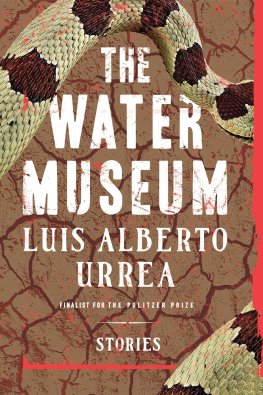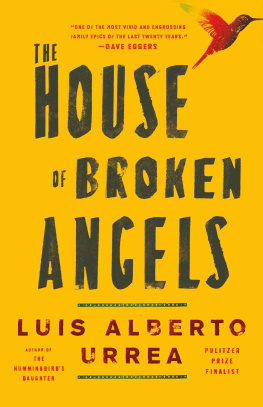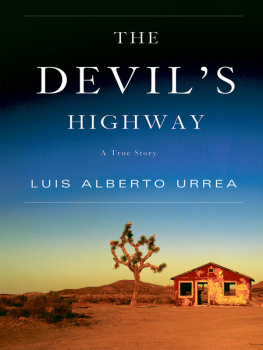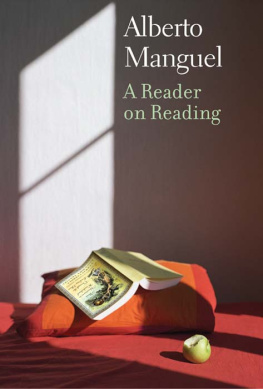Luis Alberto Urrea
The Water Museum
Man was made at the end of the weeks work, when God was tired.
Mark Twain
One. Mountains Without Number
In a beat-down house at the foot of a western butte, a woman sips her coffee and stares at her high school yearbook. Most everybodys gone. The pictures seem to be a day old to her. She still laughs at the drama club portrait, still remembers the shouting when the football team won the regional. And there she is on page thirty. She was one of the pretty ones, for sure. One of the slender ones who had a mouth that suggested to every boy that she knew a secret and was slightly amused by it. She had famous lips.
She looks at herself in her drill team uniform. Runs her finger down her skinny leg. Wonders where that girl went.
Now she keeps the shades at the back of the house pulled down so she doesnt have to look at the cliffs. A few years back a woodpecker got into her roof beam, and its all chipped out. Wood bees are rooting around in there. She has been meaning to hammer some sheet metal over that corner, but she hasnt seen woodpeckers in years not since the drouth got ahold of the land. She keeps her geraniums and little apple tree out front alive with her dirty dishwater. Saves money, though her neighbor says that makes her a Democrat. Being eco-logical and all that happy crappy. They laugh about it over the fence some mornings.
Them apples, the neighbor says, are gonna come up tastin like Lemon Joy.
But the old lady isnt out today, and the woman wonders as she often does if the neighbor is dead in there. Some days are spooky like that, and she doesnt know why. She wants everything to live forever.
Her coffee dregs go down the drain, and she rinses the cup in her plastic water bin and upends it in the dish rack and slides her keys off the counter and goes out. Turns hard left out the door so her back is to the butte. She drives a Ford F-150 with 120,000 miles on it. One bumper sticker: HONK TWICE IF YOURE ELVIS, with a little yellow smiley face. Backs out and doesnt look up. She can never find Bon Jovi on the radio. Just Jesus and Trace Adkins. But Trace is good enough. The sky feels like its on fire as she drives into town. Her morning clients are always there before she is. Waiting for her. Feels like the last six people left in the West.
* * *
Atop the butte, the spirits of the old ones are indistinguishable from the wind. From up there, the old main street is thinned by altitude and turns silver in the morning sunlight. Crows skitter across the streak of light like small embers. And her truck pulls into a diagonal slot outlined in faded yellow paint. The pickup could be any color, any color at all. It doesnt matter. The sun is turning it gray. She looks as small as a pebble in a creek bed.
Up there, the wind is an oven, and nobody below knows there are ancient fire rings and small middens of deer bones and remnants of lodges where pack rats still gather twigs from the dead white trees. Scattered across the brow of the butte, hide scrapers and arrowheads and metates hollowed out in flat rocks where acorns and pine nuts were ground by ten thousand years of women smaller than the one below but with the same thick braid of hair. Gray, everywhere gray, threading its way among the colors, as it has stitched the fields to the south. Dead watercourses form scars across the belly of the world. The oaks and the pines are as pale and colorless now as photographic negatives, except for the wide black plains to the east: dead oceans of boiling rock.
The few tourists who speed through town on that main drag dont use film anymore. Their children may never know what negatives are. If anyone takes a snapshot, it is on a smartphone. And it will be a picture of these red and black cliffs, not the town, not the woman.
The colored figures painted upon the face of the butte are the only relief for a hundred miles: white, blue, yellow.
* * *
They call her Frankie. Has been Frankie since high school. It was so cute then, so saucy. Better than Francine, by God.
Frankie pulls herself out of the Ford, wonders how her hip got so stiff. She couldnt ride a horse today if you paid her. Wonders how she got to this time in life when she tries to get up from a booth inside her diner and her hip locks on her and keeps her trapped for an extra minute until her body releases with a click like a door unlocking. How she got to this season of night fevers and wet sheets and spooky moods. Her keys are clipped onto a great purple carabiner with a small foxtail with Indian beads dangling. She sounds like bells as she moves.
Her clients await her in the scant wedge of blue shade along the wall. She nods to her breakfast club and slams the truck door and hates the way her upper arm jiggles and wishes there was a health club in town. She grins that grin of hers never aged. Her lips will always stay famous when the rest of her falls away. Health club in town? She wishes there was still a town at all.
The morning crowd nods and touches her arm and says howdy and hey-now as she pushes through them to the door. Saint Frankie of the Perpetual Coffeepot. She unlocks the door with those jangling keys, rattling and melodious. She feels like a fifth-grade schoolteacher and they feel like kids waiting for school to start. The men look her over. She still fills a pair of jeans, they think, though only she knows what size she wears now. The swinging door allows the old scents of grease and bread and donuts and eggs to join the sage and dust in the street. The breakfast club follows Frankie into the shadows, seeking refuge.
Frankie flips on the a.c. and the blowers bang to life.
They think theyve always been there, these good people, but they havent. One of her breakfast club, Ike, used to tell Shoshone tales to anyone who would listen. He was a major pain, of course, with his Indian legends. But then he died and suddenly became one of their angels. Good ol Ike! And Remember when Ike used to say? And what he said was that the cliffs did not love them because they spoke English, not Shoshone. That the spirits who tended to the butte spoke the old tongue, and nobody who ever climbed up there managed to learn a damn word of Shoshone he always pronounced it Sho-shown, like that. If you learned a few old songs and went up there to sing, the mountains would hear you, and miracles would happen. He smoked two packs a day like all the old-timers, and he died in 1987.
But the cliffs are older than the Sho-shown. The cliffs dont count years years are seconds to them. Flecks of gypsum pushed off the edge by the hot wind. They are the original inhabitants of this valley. And they werent always cliffs. They were entire mountains once, until the inevitable carving wind and scouring dust and convulsive earthquakes and cracking ice trimmed them, thinned them, made their famous face appear to oversee the scurrying of those below.
Mountains, too, are doomed to die. But it is their curse to die more slowly than anything else on earth. To weaken and fall, mile by mile, carrying their arrowheads into the gullies, and with them the gemstone skeletons of the old ones, and the great stony spines of the elder giants. Even these are mere infants to the falling mountains. All falling as grit on the flats. Tiny hills for ants to climb.
* * *
If you hit Highway 20 to Idaho Falls, youve already missed it: New Junction home of the Benson Hill High School Mountain Men and the State Champion Benson Hill Colorettes. The sign on the playing field is partly down now. It says:
SON HI
OLO ETT S
Frankies Diner is the only restaurant left in town, though there is a Taco Johns on the east side, right before you hit the Sinclair station with its green dinosaur on the sign. The mountains knew those animals well. Truckers and tourists, when they come through, stop at Taco Johns for their sodas and their burritos and their toilet breaks. Frankie doesnt seem to mind, though she keeps her feelings close. She doesnt serve hazelnut French roast anyway, she tells herself. Everything at Frankies is like it ought to be, like it used to be.








